After a long break, during which we actually did some real work to get the book out, we’re back with our series of interviews with World’s Collider writers. Today’s victim, in so many ways, is Steven Savile, one of our most successful and well-known writers. He sold more books last Tuesday than most writers do their entire careers. He also ghost-writes for JK Rowling. True story. Elise Hattersley asks Steven about life in Sweden, his lack of affinity for horror, and something about his fecund penchants…
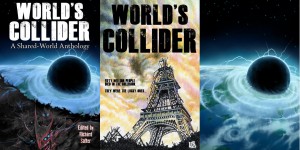
The Black Library, Laughing Boy’s Shadow, London Macabre, and any number of bleak visions besides… Steven, you’ve shown an unmistakable penchant for darkness. What attracts you to the dystopian and the morbid?
 Goodness me… erm. Ah. Hmmm. Honestly? I’m not. I know that sounds weird, but I can’t stand horror films, haven’t read a horror novel in probably a decade. The thing is, when I was first getting into writing, I was reading a load of fantasy, for a while it was a Michael Moorcock book a day, it was David Eddings, Stephen Donaldson, Lyndon Hardy, Hugh Cook, Roger Taylor, just anything and everything. I had about two hours on the bus every day, minimum, from Prudhoe in to Newcastle where I was at University and the time needed to be killed.
Goodness me… erm. Ah. Hmmm. Honestly? I’m not. I know that sounds weird, but I can’t stand horror films, haven’t read a horror novel in probably a decade. The thing is, when I was first getting into writing, I was reading a load of fantasy, for a while it was a Michael Moorcock book a day, it was David Eddings, Stephen Donaldson, Lyndon Hardy, Hugh Cook, Roger Taylor, just anything and everything. I had about two hours on the bus every day, minimum, from Prudhoe in to Newcastle where I was at University and the time needed to be killed.
The first ever attempt at writing a novel was Old Yawn and the Wizard’s Banana… my second was a lampoon of everything I’d ever read called The Ohmygodnotagainriad, of which Interzone said ‘Please God, no more! The world doesn’t need another Terry Pratchett!’ It was all slightly comic, not very brilliant fantasy. Then I wrote BIX which I sent in to Richard Evans at Gollancz, and got the most brilliant rejection letter, to whit ‘half of this is every bit as brilliant and creative as Pratchett, half of it is really rough. Please please please send me the next thing you do, I think you’ve got a brilliant future ahead of you once you get some discipline.’
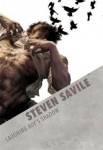 I was about 19 at this point, and a book cover in Waterstones kept calling to me, RAIN by Stephen Gallagher. There was something about it. The plain blue, the metallic rain on the hardcover. I bought it and devoured it. Then went for everything Stephen had written. Around the same time I met Stephen Laws in an old comic shop in Newcastle called Timeslip, and he convinced me to buy The Wyrm, and then invited me to an event in Gateshead library with Bob Shaw, Ian Watson and Steve, so I went along and met everyone, and got to chat with Steve who introduced me to Chaz Brenchley, who became one of my very best friends in the world. His first novel Samaritan had just come out in paperback… god we’re going back… anyway it seemed to be that all around me people were writing dark stuff, gritty, realistic stuff. So I sat down and thought, hell, let’s have a go at this instead of always trying to be funny…
I was about 19 at this point, and a book cover in Waterstones kept calling to me, RAIN by Stephen Gallagher. There was something about it. The plain blue, the metallic rain on the hardcover. I bought it and devoured it. Then went for everything Stephen had written. Around the same time I met Stephen Laws in an old comic shop in Newcastle called Timeslip, and he convinced me to buy The Wyrm, and then invited me to an event in Gateshead library with Bob Shaw, Ian Watson and Steve, so I went along and met everyone, and got to chat with Steve who introduced me to Chaz Brenchley, who became one of my very best friends in the world. His first novel Samaritan had just come out in paperback… god we’re going back… anyway it seemed to be that all around me people were writing dark stuff, gritty, realistic stuff. So I sat down and thought, hell, let’s have a go at this instead of always trying to be funny…
 Then when I finished my first proper novel I recall my agent at the time saying, ‘Christ this is grim, Steve. There’s not a single gag in it, not a single moment you even smile, it’s unrelenting…’
Then when I finished my first proper novel I recall my agent at the time saying, ‘Christ this is grim, Steve. There’s not a single gag in it, not a single moment you even smile, it’s unrelenting…’
So I guess it was one extreme to another…
But then after about ten years of ‘macabre’ shorts and trying to break into the horror genre, the genre pretty much went and collapsed on me and I went back to what I’d always loved, which was fantasy. I started a novel, The Bones of Dominion, which I thought would be my breakthrough, but it wasn’t. And I’d pretty much given up, really and wasn’t sure what I was going to do, when I went and won the Writers of the Future for a fantasy novella (well, more like magical realism) Bury my Heart at the Garrick, which was about the last week of Houdini’s life. And then I started hitting my stride, mixing fantasy with the real world I live in, and just being observant and thinking ‘what if?’
 Of course, when the break came to do the Warhammer series, it wound up being bloody vampires… I hate bloody vampires…. Time and again I tried to pitch other ideas but they came back saying ‘can you do a necrarch one now… can you do lamians next? And I ended up saying no, I’d said anything I could ever imagine saying about vampires in Inheritance, never mind the other three that followed…
Of course, when the break came to do the Warhammer series, it wound up being bloody vampires… I hate bloody vampires…. Time and again I tried to pitch other ideas but they came back saying ‘can you do a necrarch one now… can you do lamians next? And I ended up saying no, I’d said anything I could ever imagine saying about vampires in Inheritance, never mind the other three that followed…
BUT… I guess the fact I’d spend a decade working on horror stuff meant that my fantasy and even the thriller, Silver, wound up being grim… we’re a product of our environment, after all.
You’ve written for adults and for a YA audience. How does your approach vary according to the intended audience?
 Hmm. There’s only one main difference, really, and that’s in tone. I don’t dumb down the language, for instance, but I shift the tone, aiming for something more ‘magical’ in the way the story is delivered. I think it probably sounds weird, but what I remember most from reading growing up was the fantastic feeling of encountering something for the first time… so I’m less conscious of say a brilliantly original idea and more conscious of hitting a really lovely way of delivering it.
Hmm. There’s only one main difference, really, and that’s in tone. I don’t dumb down the language, for instance, but I shift the tone, aiming for something more ‘magical’ in the way the story is delivered. I think it probably sounds weird, but what I remember most from reading growing up was the fantastic feeling of encountering something for the first time… so I’m less conscious of say a brilliantly original idea and more conscious of hitting a really lovely way of delivering it.
Do you have a preference for either? Which one, and why?
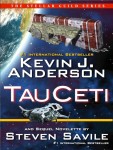 I tend to love them both, but at different times. I need one to cleanse the palette when having done the other. I’ve spent probably six months out of the last twelve working on Moonlands stuff, and having an absolute blast with it, but in between all of that stuff I wrote Each Embers Ghost, an urban fantasy based in London, and Dark Waters, the adaptation of the new Risen 2 computer game (out in August). Heck, actually I also did Tau Ceti, my first ‘science fiction’ novella, in collaboration with Kevin J Anderson… all of this, of course, was to distract myself from the fact I had a new thriller to write, heh.
I tend to love them both, but at different times. I need one to cleanse the palette when having done the other. I’ve spent probably six months out of the last twelve working on Moonlands stuff, and having an absolute blast with it, but in between all of that stuff I wrote Each Embers Ghost, an urban fantasy based in London, and Dark Waters, the adaptation of the new Risen 2 computer game (out in August). Heck, actually I also did Tau Ceti, my first ‘science fiction’ novella, in collaboration with Kevin J Anderson… all of this, of course, was to distract myself from the fact I had a new thriller to write, heh.
You’ve been really prolific so far. How do you maintain the focus required for such a fecund career?
See above. Really, it’s all about the popcorn theory. I have a lot of ideas, and I mean a lot. I can probably come up with a new idea for a series of novels three times a month, the trick is finding the one that really sings inside me. For a while now I’ve been writing full time – since 2005 – and it’s been difficult sometimes to make ends meet, and other times it’s been very comfortable. The thing is the need to eat can really help you focus.
 I decided to divide my career into two, the ‘tie-in’ and the ‘original’ using one to pay for the other and keep the food on the table and the roof over the head. I can write fast, or take my time, too, meaning I can do the one month deadline on a novelisation, or 9 months working on something like London Macabre. The trick is to keep feeding the creative soul. The satisfaction of finishing things. Doing the odd little quirky fun thing that isn’t all about food, like World’s Collider, which was too much fun to pass up. And lets be honest, I work hard. I put at least 6 hours a day in, arse in seat, writing. That’s aside from stuff like interviews, email correspondence etc. Just the concentrated effort of writing. That means I have time to do the stuff I love, too.
I decided to divide my career into two, the ‘tie-in’ and the ‘original’ using one to pay for the other and keep the food on the table and the roof over the head. I can write fast, or take my time, too, meaning I can do the one month deadline on a novelisation, or 9 months working on something like London Macabre. The trick is to keep feeding the creative soul. The satisfaction of finishing things. Doing the odd little quirky fun thing that isn’t all about food, like World’s Collider, which was too much fun to pass up. And lets be honest, I work hard. I put at least 6 hours a day in, arse in seat, writing. That’s aside from stuff like interviews, email correspondence etc. Just the concentrated effort of writing. That means I have time to do the stuff I love, too.
You’ve been living in Sweden for some time now. Why Sweden? Are there any plans of coming back to the UK?
I had my 15th anniversary last week. That’s longer than I’ve lived in any one part of the UK, by a long stretch. The why? Short version, I broke up with a girl and went on holiday and decided to stay. I love the quality of life out here, and can’t imagine living in the UK ever again, to be honest, I come back and see the grief left behind by the recession, the empty shops on the high street, and the general feeling of depression about the place, but there’s something weird about imagining being buried in a foreign country… but this is where my life is. The long version of the story’s not that exciting heh.
A lot of your work has been based on television shows; Doctor Who, Primeval, Torchwood – just to name a few. Do you have any interest in writing screenplays in the future?
 Well, I’ve actually written one, The Only One, which is based on the music of Love and Money, if you remember the band? James Grant, the lead singer, is a good friend and the idea of doing something with his music as a soundtrack was too much fun not to try. I’m hoping that in the next three or four years we’ll get it onto the screen…
Well, I’ve actually written one, The Only One, which is based on the music of Love and Money, if you remember the band? James Grant, the lead singer, is a good friend and the idea of doing something with his music as a soundtrack was too much fun not to try. I’m hoping that in the next three or four years we’ll get it onto the screen…
Your work has provided inspiration for many. Where do you find your inspiration?
That’s a ridiculously tough question when I actually try and think about it… I’ve always admired Clive Barker, especially for Weaveworld, but also for the way he’s managed his career, doing what he wants, be it movies, kids books, epic sprawling tales of magic and horror… computer games… you see a connection? When I was 19 I set myself a challenge, I wanted to be as successful as Barker was that day. He was forty, and Weaveworld was just out in paperback… I had my fortieth not so long ago and did a count up, and whilst I might not have the name recognition etc I’ve done some amazing stuff, like writing the storyline for Battlefield 3, which sold what, 23m copies? I’ve had novels in getting on for a dozen languages, thanks to Primeval had a #1 UK bestseller in hardback, and thanks to Silver, had a #2 bestseller in ebook… I don’t feel like I let my 19 year old self down too badly.
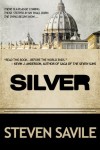 The thing is, I guess, I’m like a magpie, attracted to shiny new things. That’s where I’m inspired, and friends inspire me, guys I work with inspire me, and when it comes to writing I really really really don’t want to let any of them down, so day after day I try to do the best I can. For me. For them. For the guys who decide to pay for one of my stories instead of a beer or a packet of fags or a dvd night…
The thing is, I guess, I’m like a magpie, attracted to shiny new things. That’s where I’m inspired, and friends inspire me, guys I work with inspire me, and when it comes to writing I really really really don’t want to let any of them down, so day after day I try to do the best I can. For me. For them. For the guys who decide to pay for one of my stories instead of a beer or a packet of fags or a dvd night…
How was the experience of writing for World’s Collider for you?
It was a challenge. Genuinely. Because by the time I got the original file to work with everyone had written their pieces and it was down to me to wrap it all up so all of those dangling threads and bright ideas folks had had suddenly came together, no plot point unresolved. It was like cementing in the final pieces of the mosaic, I guess. And there was lots of animated discussion with Richard as we’d hit something that needed careful adjustment to just click into place, or needed developing or well, lots of ors, I guess. That would have been hard enough all by itself, but right in the middle of the first draft, about halfway through, I went and broke my arm in a pretty bad bike accident (google ‘beheaded radius at the elbow’ for lots of images of what I looked like, but not at work unless you want to be fired for looking at horrific images) so my good friend and co-writer Steve Lockley stepped in and helped, along with Dragon Dictate and the painkillers, to create the final story you have before you now…
Anything you would like to plug?

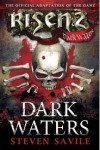 Well, in terms of books, August sees the release of a few projects, Risen 2, the novelisation of the computer game, via Penguin’s Sunbird list, and Each Ember’s Ghost, a modern day London fantasy/horror for the Fireborn RPG.
Well, in terms of books, August sees the release of a few projects, Risen 2, the novelisation of the computer game, via Penguin’s Sunbird list, and Each Ember’s Ghost, a modern day London fantasy/horror for the Fireborn RPG.
You’re invited into a suspicious laboratory. A wild-haired, crazy-eyed professor offers you the chance to work on any science fiction project from the past. What do you choose?
I was going to think long and hard about it, there are loads of cool ones like working on the Nautilus or journeying to the centre of the earth or or or… but one leapt right into the front of my mind so I figure I’ll go with that one: The Time Machine…
Visit Steven Savile’s website.
World’s Collider – a shared-world anthology, is now available to order from Amazon US, Amazon UK or in trade paperback direct from Nightscape Press.